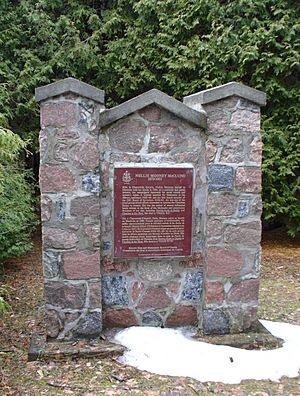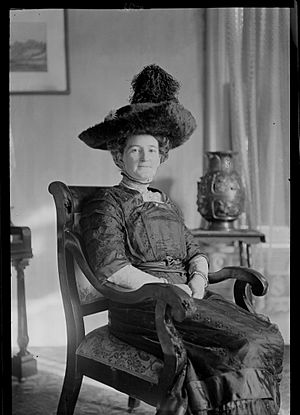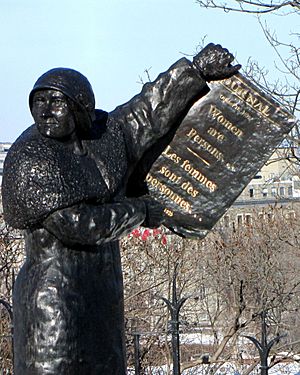Nellie McClung facts for kids
Quick facts for kids
Nellie McClung
|
|
|---|---|
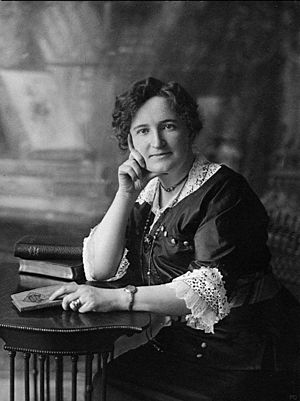 |
|
| Member of the Legislative Assembly of Alberta | |
| In office 18 July 1921 – 28 June 1926 |
|
| Succeeded by | John Lymburn, Charles Weaver, Charles Gibbs, Warren Prevey and David Duggan |
| Constituency | Edmonton |
| Personal details | |
| Born |
Nellie Letitia Mooney
20 October 1873 Chatsworth, Ontario, Canada |
| Died | 1 September 1951 (aged 77) Victoria, British Columbia, Canada |
| Political party | Liberal |
| Spouse |
Robert Wesley McClung
(m. 1896) |
| Children | 5 |
| Occupation | Politician, Writer |
| Known for | Women's rights activism |
Nellie Letitia McClung (born Mooney; October 20, 1873 – September 1, 1951) was a famous Canadian author, politician, and social activist. She is known as one of Canada's most important suffragists. A suffragist is someone who fights for women's right to vote.
Nellie McClung started her writing career with her book Sowing Seeds in Danny in 1908. She eventually wrote sixteen books, including two about her own life. She played a big part in helping women get the right to vote in Alberta and Manitoba in 1916. McClung was elected to the Legislative Assembly of Alberta in 1921 and served there until 1926.
She was also one of the "Famous Five" women. These five women fought for women to be allowed to serve in the Senate of Canada. They took their case, called the Persons Case, all the way to Canada's highest court at the time. In 1936, McClung became the first woman to join the board of the Canadian Broadcasting Corporation (CBC). She also represented Canada at the League of Nations in Geneva, Switzerland in 1938.
Contents
Early Life and Education
Nellie Letitia Mooney was born on October 20, 1873, in Chatsworth, Ontario. She was the youngest of six children. Her family struggled financially because their farm land was not very good. In 1880, when Nellie was seven, her family moved to the Souris River valley, west of Winnipeg.
Nellie finished school at the Manitoba Normal School when she was sixteen. After getting her teaching certificate, she started teaching in Hazel, Manitoba. She earned $40 a month. After teaching for eighteen months, she moved to Manitou.
While teaching in Manitou, she lived with the McClung family. She was very impressed by Mrs. Annie E. McClung, who was a suffragist and a leader in the Woman's Christian Temperance Union (WCTU). Nellie married Mrs. McClung's son, Robert Wesley, in August 1896. They had five children between 1897 and 1911. Nellie was active in many local groups, including the WCTU.
A Career in Writing and Activism
The McClung family faced money problems starting in 1905. To help out, Nellie began writing short stories for magazines. Her first novel, Sowing Seeds in Danny, was published in 1908. It became a huge success, selling 100,000 copies and earning her $25,000.
Because her book was so popular, Nellie was asked to speak at events across Manitoba and Saskatchewan. This started her career as a public speaker. Her second book, A Second Chance, came out in 1910. She then went on a speaking tour in Ontario, where her talks were very popular. The Hamilton Herald newspaper reported that she "took her audiences by storm."
Nellie wrote three more books in the 1910s, including In Times Like These. This book is seen as an important work for first-wave feminism, which was about women gaining equal rights. Throughout her life, McClung wrote sixteen books, two autobiographies, and many poems, short stories, and newspaper articles.
Fighting for Women's Rights
In 1911, the McClungs moved to Winnipeg. The next year, Nellie and fourteen other women started the Women's Political Equality League. This group focused on getting women the right to vote. In 1914, the league asked the Premier of Manitoba, Rodmond Roblin, to allow women to vote, but he said no.
The next day, the Political Equality League put on a "Mock Parliament" at the Walker Theatre. The women pretended to be government ministers. Nellie McClung played the role of Premier Roblin. She repeated many of the reasons he had given for not letting women vote, but in a funny way to show how unfair they were.
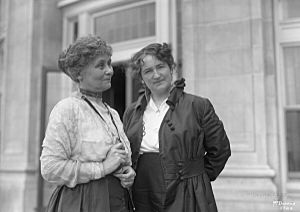
Nellie McClung supported the Manitoba Liberal Party in the 1914 and 1915 elections. The McClungs then moved to Edmonton, Alberta. The Liberal Party won the 1915 election in Manitoba. In January 1916, Manitoba became the first province in Canada to give women the right to vote. This happened exactly two years after the Political Equality League had first asked Premier Roblin.
In Alberta, McClung continued to fight for important causes like healthcare and women's rights. In the 1921 election, she was elected to the Legislative Assembly of Alberta for Edmonton. She was a member of the Liberal Party. Nellie was one of only two women elected that year. The other was Irene Parlby. McClung often worked with Parlby to support laws that helped women. Nellie ran for office again in 1926 but lost by a small number of votes.
The Famous Five and the Persons Case
Nellie McClung was one of five women, known as the Famous Five. The other women were Irene Parlby, Henrietta Muir Edwards, Emily Murphy, and Louise McKinney. In 1927, they asked for a clear answer about the word "persons" in Canada's old constitution. They wanted to know if women were considered "persons" and could serve in the Senate of Canada.
This case, called the Persons Case, first went to the Supreme Court of Canada. The court decided that women were not "qualified persons" and could not be in the Senate. The Famous Five then appealed this decision to the Judicial Committee of the Privy Council in England, which was Canada's highest court at the time. In 1929, this court overturned the Supreme Court's decision. This meant women were indeed "persons" and could serve in the Senate. The next year, Cairine Wilson became the first woman appointed to the Senate.
In 1936, Prime Minister William Lyon Mackenzie King appointed Nellie McClung to the board of the Canadian Broadcasting Corporation (CBC). She was the first woman to serve on its board. In 1938, King also asked her to be a delegate to the League of Nations in Geneva. McClung felt that the League was sometimes too focused on arguments instead of real progress.
Later Life and Legacy
Nellie McClung moved to Victoria, British Columbia, in 1933. She lived there for the rest of her life. Her health declined in the late 1930s. She had a heart attack in 1940, which made it hard for her to travel. She continued to work for the CBC board through letters until she resigned in 1942. She published the second part of her autobiography, The Stream Runs Fast, in 1945. Nellie McClung passed away on September 1, 1951, at the age of 77.
McClung's Views
Nellie McClung believed that women had a special role in society. She thought women were "morally superior" to men. She felt that women's natural caring instincts made them better suited for politics. In her book In Times Like These (1915), she wrote that "men make wounds, and women bind them up."
Lasting Impact
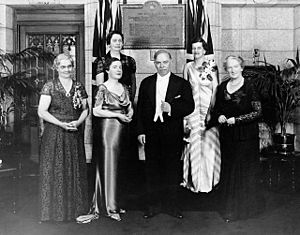
In 1954, the Canadian government recognized Nellie McClung as a Person of National Historic Significance. There is a plaque in Chatsworth, Ontario, to remember her. On August 29, 1973, McClung and the other four women from the Persons Case were honored with a special 8-cent stamp. The Persons Case itself was recognized as a National Historic Event in 1997. In October 2009, the Senate of Canada named Nellie McClung and the rest of the Famous Five Canada's first "honorary senators."
Nellie McClung's house in Calgary, Alberta, where she lived from 1923 to the mid-1930s, is still standing and is a protected heritage site. Two other houses where McClung lived were moved to the Archibald Museum in Manitoba. They were later moved back to Manitou in 2017 and are now open to the public. The McClung family home in Winnipeg is also a historic site.
See also
 In Spanish: Nellie McClung para niños
In Spanish: Nellie McClung para niños
- Feminism in Canada
- List of suffragists and suffragettes
- List of women's rights activists
 | Madam C. J. Walker |
 | Janet Emerson Bashen |
 | Annie Turnbo Malone |
 | Maggie L. Walker |


